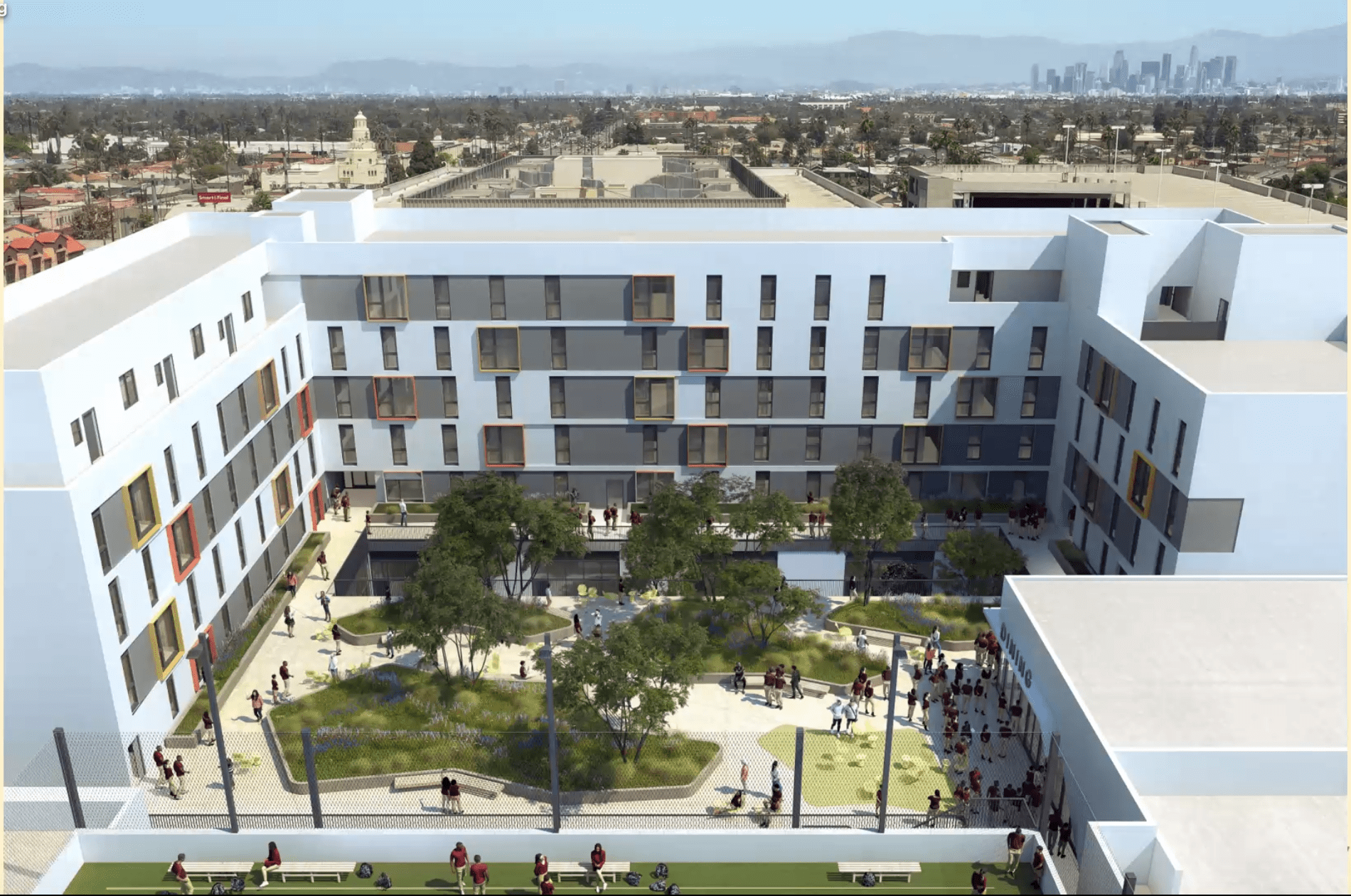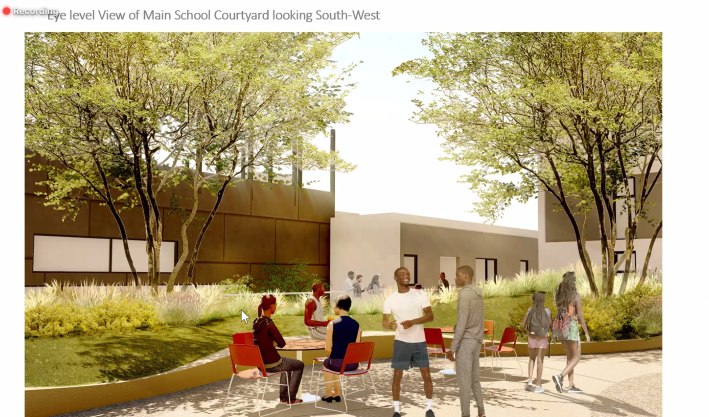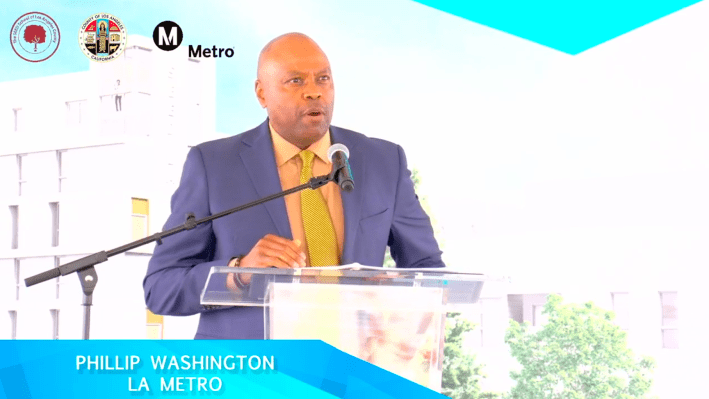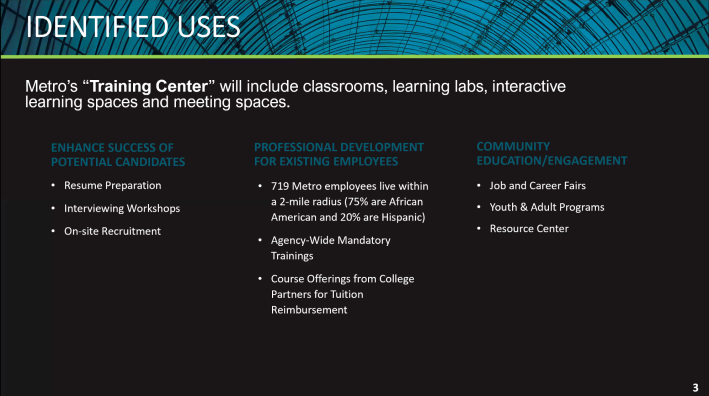At the October 21 groundbreaking for the SEED School of Los Angeles County - a college-prep boarding school that, in partnership with Metro and L.A. County, aims to prepare some of L.A.'s most marginalized youth for lucrative careers within the transportation and infrastructure sectors - an emotional Mark Ridley-Thomas spoke to the significance of this happening at this moment and at this location.
"Change. Equitable change. Change that is rooted in justice,” he said. It’s “the right change for the right time, and God knows at the right place."
"For almost three decades, this lot [at Vermont and Manchester] has come to symbolize the lack of progress and opportunity that far too many communities of color have been relegated to and had to contend with,” the County Supervisor and Metro Boardmember continued. “Thank God we never gave up. We kept pushing. We kept dreaming. And we kept climbing. And here we are today."
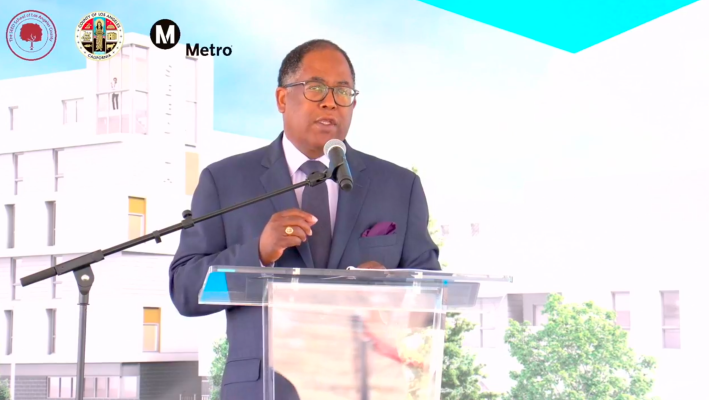
It had indeed been a long road.
In 1992, Ridley-Thomas was a newly elected Eighth District councilmember when the swap meet across the street from his constituent center went up in flames.
Over the subsequent decades, both he and current councilmember Marqueece Harris-Dawson, who spent 20 years just three blocks up the street at Community Coalition, saw firsthand how effectively blight could discourage investment and squelch positive spillovers from improvements made on neighboring blocks. They also witnessed how difficult it was for stakeholders to do anything about it. Namely, the 2008 eminent domain process launched via the Community Redevelopment Agency (CRA) dragged on for nearly four years before finally falling apart in 2012, when then-governor Jerry Brown dissolved the CRA.
The Vermont/Manchester lots were by no means the only ones that had been allowed to languish after 1992. But sitting at the junction of two major corridors and spanning three full city blocks (at least until Sasson sold off the parcel at 83rd in 2007), they were a glaring reminder of how much residents were at the mercy of owners that had no connection to or concern for their community.
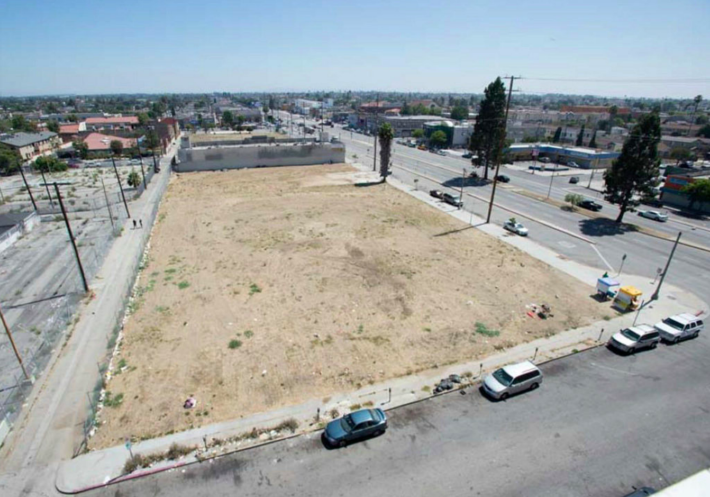
And few developers had promised as much as Eli Sasson had.
For years, Sasson had teased residents with renderings of an outdated but sparkly mall that would offer many of the amenities and job opportunities they had to travel far outside of the community to access. He'd even held a full-on groundbreaking in 2015 and capped it off by knocking down the empty Payless store there to make it appear things were actually moving forward.
But he had never taken any serious steps toward bringing the project to fruition.

When questioned about the lack of progress a year after the groundbreaking, Sasson acknowledged the ceremony had been premature but pointed the finger back at the city, this time contending the Department of Water and Power (DWP) was making it difficult to resolve some electrical wiring issues.
By the winter of 2016 - the projected completion date of the mall - the lots were in even worse shape than they had been before. The scaffolding haphazardly erected around the site had helped provide cover for unhealthy activities, and reports of aggravated assaults, robberies, shootings, a man being set on fire, and people being chased by someone armed with a machete were racking up.
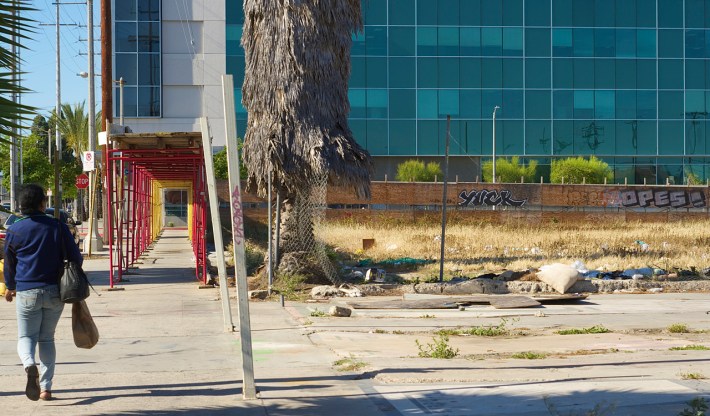
So when Metro CEO Phil Washington first approached both Ridley-Thomas and Harris-Dawson with a vision for a specialized school that would help build opportunity infrastructure for underserved Black and brown youth, both knew exactly where it needed to go.
Within about a year's time, the County had launched its eminent domain bid; it finally won control of the lots in April of 2018.
_______
The first of its kind in the state, the school will be managed by the SEED Foundation, an organization that specializes in supportive boarding schools, and feature a STEAM-focused curriculum modeled after New York’s Transit Tech, the school that inspired it. Metro's role, according to the 2018 feasibility report on the project, will be to "provide real-world learning opportunities for students, curriculum supports, mentorships, hands-on learning opportunities, teacher professional development, and other programming that helps to expose, educate, and employ youth in the transportation industry.”
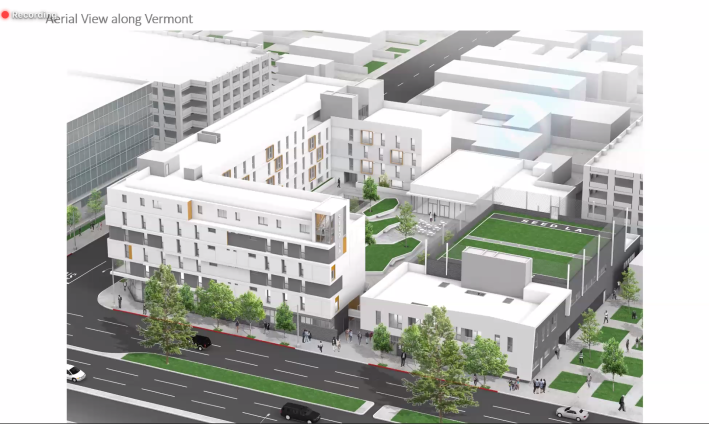
To accommodate the 400 students who will live there during the school week (students will return home on the weekends), the 147,000-square-foot campus will feature 170 dorm rooms, 20 staff apartments, 20 classrooms, science labs, a maker space lab, an art studio, conference rooms, a gym, a dining hall, an outdoor recreation space, courtyards, and a roof garden.
Eligible students will be chosen by what SEED representatives described as a weighted lottery aimed at giving students from the Vermont/Manchester area priority. They will be pulled from a larger pool of “resilient” youth applicants - those who are currently receiving services from or are at risk of entering, the County’s child welfare system, probation department/juvenile justice system, or homeless services.
In offering round-the-clock supportive services to students who tend to bounce from school to school, the program aspires to provide both academic and social stability to the kids most at risk of falling through the cracks as they move into adulthood.
With Metro facing the retirement of over forty percent of its professionals over the next decade - a "silver tsunami," as Metro CEO Phil Washington put it during his remarks - there's a pressing need to invest both in the next generation of transportation, engineering, and planning professionals and in opening up channels to help move them into the industry. Especially as Metro gears up for what Washington described as the largest expansion of transit in North America. And especially at this moment of racial reckoning, when institutions across the country are finally beginning the process of righting some of the historical wrongs they had a hand in inflicting upon the communities they were supposed to have been serving.
While the project might check all of those boxes, for Washington, who grew up on the South Side of Chicago, this mission was also personal. "When I saw infrastructure being built in my community, there were people there that did not look like me,” he said. “And when I sought a job, I was told that either I was too late to get the job or I was not trained. No more will our kids be told that."
Now, he said, he looked forward to a day when he could geek out with an area teen about design-build, public-private partnerships, and innovative ways to lift up their community. "People may call that kid a nerd, but that kid will be able to go all over the world and use their skills,” he said. In turn, he continued, “L.A. County will become the infrastructure center of excellence. What we want is for people all over the world to say...‘If you want young people that know infrastructure, go to L.A. County. Go to Vermont-Manchester.’”
Harris-Dawson concurred. Finding a solution for the Vermont-Manchester lots had been his top priority when he first took office in 2015.
When making the case the County should move forward with the eminent domain process in 2017, he had pointed out that children had been born, grown up, and gone on to begin their own families, all while the lots continued to limit the potential of the area. Speaking at last week's groundbreaking, he described the opportunity to reclaim and transform the lots as a chance "to memorialize what this community has been through. The price that we paid. The price that these neighborhoods [paid]. The opportunities that we missed. The visions that weren't realized because it took us so long to get this done."
The investment in the area’s youth that this unique school promised to make, he continued, would help ensure “that our children and our families [have] a role and a place in this city for generations to come."
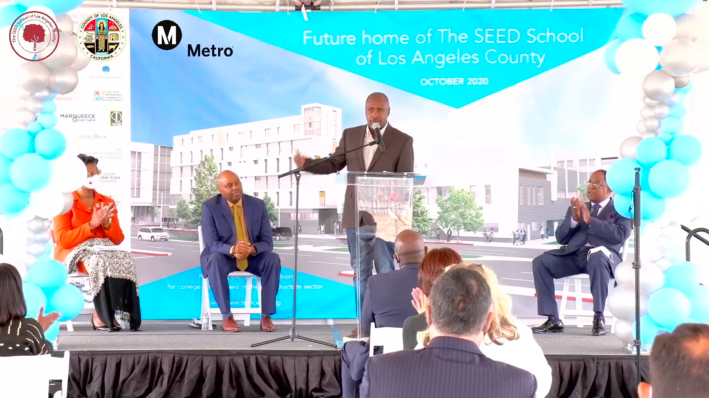
_______
As he prepared to introduce some of those responsible for making the SEED school a possibility, including cornerstone donors Dr. Natasha and Brandon Beck, Ridley-Thomas reiterated that this event would definitively mark a new chapter for the community. "Groundbreaking celebrated without construction to follow had been the norm at a certain point," he intoned. "But no more."
Nor will this groundbreaking be the last these lots will see.
The school represents the first phase of the larger Vermont and Manchester Transit Priority Joint Development Project. The second phase, developed by Primestor, Bridge Housing, and the Coalition for Responsible Community Development (CRCD), is scheduled to break ground next fall. It will include 180 units of affordable housing (62 of which will be reserved for seniors), a grocery store, community-serving retail, a business incubator space, and a transit plaza (serving the Bus Rapid Transit planned for Vermont).
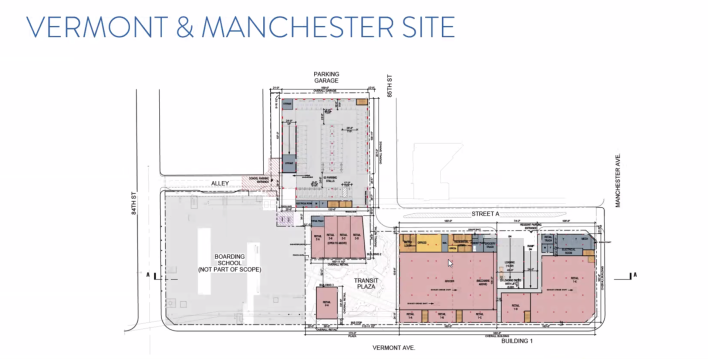
It will also feature a Metro-operated Training and Innovation Center offering professional development resources for Metro employees (over 700 of whom live within two miles of the future Center), as well as adults who are simply seeking employment with Metro and opportunities for professional advancement.
It is not the mall many hoped for, and some residents remain disappointed that there will be comparatively little retail. Others have voiced concerns about whether the youth will be given adequate support and access to services, given the range of needs they are likely to have.
While those concerns were not addressed at the groundbreaking, Lesley Poole, CEO of the SEED Foundation, and other SEED representatives did try to reassure stakeholders regarding SEED's intentions during informational zoom sessions held over the summer. They reiterated that SEED's practice was not to have law enforcement or armed security present on their campuses. They also said they would be open to creating a curriculum that engaged the history of the area to better root the school in the community.
When confronted with some of those concerns at a community engagement event held on the lots in 2018, Ridley-Thomas had held steadfast to the idea that there was too much unfinished business at hand to wait for a negligent private developer to finally do right by the neighborhood. The site’s positioning within a community of such great need and on the second-busiest transit corridor in the county meant it had great potential to connect people to jobs and opportunity. The community could not afford to see that potential squandered any longer.
While many cities were only just now "publicly wrestl[ing] with what a more equitable, truly anti-racist form of governance and investment can and should look like," Ridley-Thomas said last week, that had been "the conversation in many respects that [had originally driven] us to believe that [this project] was what we needed right here and right now."
With this unique public-private partnership prioritizing equity and opportunity, he continued, "we invest in the physical infrastructure, but we deposit in the human infrastructure that's yet to come forth. And that's why we are here today - to celebrate...the tremendous leadership potential that will arise from this environment."
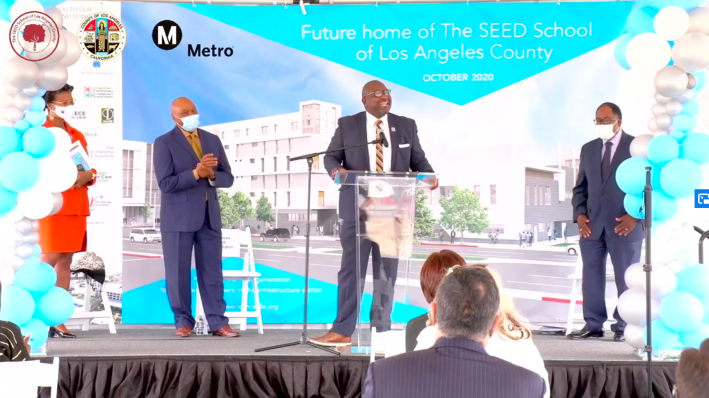
_______
There is an informational zoom session on the affordable housing component of the project tonight, October 28, from 6 to 8 p.m. You can participate here. Last month's workshop on local hire - a priority of the project - can be found here.
The full groundbreaking ceremony can be seen below.
Past coverage of the Vermont/Manchester lots:
- October 16, 2018, As Vermont/Manchester Transportation School Moves Forward, Community Reckons with Past, Wrestles with Form Change Should Take
- April 26, 2018, County Wins Control of Vermont/Manchester Lots in Superior Court Ruling
- February 7, 2018, New Renderings for Housing, School, Transit Plaza Planned for Vermont/Manchester Posted Ahead of Saturday Forum
- December 5, 2017: County Board of Supervisors Approves Condemnation of Vermont/Manchester Lots, Moves Forward on Eminent Domain
- November 30, 2017: County Looks to Eminent Domain to Rewrite Future of Vacant Lots at Vermont/Manchester
- April 6, 2017: South Central Youth Assess Stasis and Change 25 years after the 1992 Unrest
- June 1, 2016: A Year after Breaking Ground at Vermont and Manchester, Major Shopping Center Project Appears to Have Stalled
- April 30, 2015: Vermont Entertainment Village Breaks Ground; Residents Ask That Local Hiring Be Cornerstone
- April 28, 2015: Long-Blighted South L.A. Lots to See Groundbreaking on Massive Development Wednesday
